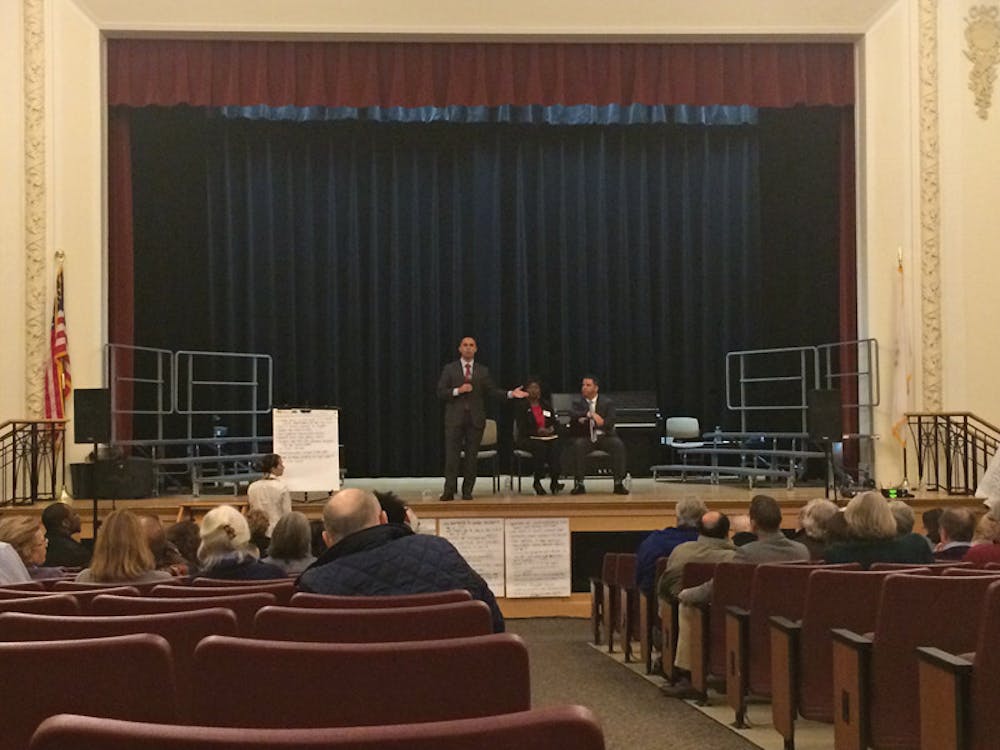Mayor-elect Jorge Elorza sat on stage with crossed legs for just under two hours at the One Providence Listening Forum Monday at Nathan Bishop Middle School, taking note of Providence residents’ concerns on a range of topics including education, public safety, housing and transportation.
Joining Elorza on stage for the last in the four-part listening forum series — in which residents, rather than Elorza, spoke — were two of his three transition committee co-chairs: Lisa Ranglin and Victor Capellan. With 230 community members in attendance, this forum was the most well-attended of all the events, Elorza said.
Mary Frappier, a Highlands resident, raised the issue of burying the power lines on the Providence-East Providence waterfront. National Grid has estimated the project to cost $33.9 million, with just $18 million raised in the last decade, according to a Nov. 24 op-ed by former R.I. Attorney General Patrick Lynch in the Providence Journal.
At community meetings about the power lines, National Grid representatives are “very polite, they’re very well-dressed, they promise to do something,” but nothing ends up happening, Frappier said. “I would like the mayor to put a fire under them.”
Residents at the forum also voiced several concerns about the public education system. Many residents asked for pre-kindergarten education opportunities on the East Side. After the Providence Public School Department shut down the last pre-kindergarten program on the East Side in April, children there had to be bused to the West Side of Providence to attend pre-K programs, one resident said.
“You are all paying for that,” she said, pointing to the crowd. “You’re paying to bus my child across town.”
The issue is related to “brain drain,” a phenomenon in which young people leave a city in search of opportunities elsewhere. Part of the reason people move away from Providence is because of the bureaucracy surrounding the city’s public education system, the same resident said.
Jonathan Howard, a 30-year-old Providence resident and nonprofit consultant, advocated for a city program that would bring nonprofit groups together to support each other. He also said that social accounting — increased transparency of the city’s financial relationships — should be imposed on the University to justify the “millions of dollars” it enjoys in tax privileges as a nonprofit organization.
Residents raised other issues including streamlining public transportation for commuters and people with disabilities, increasing transparency in City Hall, keeping youth actively involved in the community and making the city more business-friendly.
Several groups used the forum as an opportunity to bring attention to their organizations’ causes.
Raymond Watson, executive director of the Mount Hope Neighborhood Association, asked that more people from the East Side — the community with “the most resources” — give the Mount Hope neighborhood not a “hand out,” but a “hand up.”
A spokesperson for the advocacy group Direct Action for Rights and Equality raised the issue of housing availability for low-income people.
“The word ‘affordable’ is always thrown around, but affordable to whom?” the representative asked.
Audience members expressed satisfaction overall with the listening forum.
The forum “was excellent,” Frappier said. “You got to hear other people’s concerns.”
At the foot of the stage, a woman took notes on each resident’s concerns on a large notepad for audience members to see throughout the event.
“I think the fact that they were taking notes — listening and not speaking — really showed a lot of respect for the citizens,” Howard said. “It’s unusual in a political gathering.”





